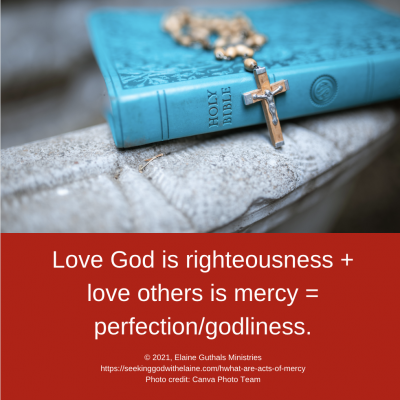If our goal is godliness and being like God, then we need to be merciful. This daily devotional includes discussion of acts of consideration, compassion, prayer, and helpfulness.
Nuggets
- God considers how merciful we are when showing us mercy.
- Disciples of Christ are to be known by their compassion.
- Righteousness and mercy go hand in hand with prayer.
- Mercy should be appropriate to the situation with which the disciples of Christ are addressing.
Devotions in the Being Merciful Leads to Godliness series

If you have read my devotionals before, you know I like to take outline sermons and dig deeper to see what they can tell us. Surprisingly, I haven’t found many that address godliness yet.
I did run across one that discusses mercy. To me, being merciful is a big component of being godly.
It is a sermon by Blair entitled Mercy. I am probably going to have to divide some of these, so it is going to be a little longer than I am originally planning.
Resource
Let's Put It into Context
God’s mercy is the unexpected way God responds in love to our needs. Disciples’ mercy is a characteristic of compassion for the needs of others, especially those who are in distress.
Glossary
To read a related devotion, click the button below.
What Considerations Does God Have When He Shows Us Mercy?
“With the merciful you show yourself merciful; with the blameless man you show yourself blameless” (Ps. 18: 25 ESV)
God considers how merciful we are when showing us mercy.
The very first sermon I looked at under this verse talked about poetic justice.
Oh, yeah. I was scratching my head on that one.
When we think poetic justice, we normally think vindication, not mercy. Retribution is another good word to describe it.
The concept is we get what we deserve.
Ooo, baby. That is the direct opposite of mercy. Mercy is, even though we deserve bad things as punishment, God doesn’t give them to us.
But why do we have to only think of it in negative terms? Why can’t we look at the flip side?
Look what Chadwick said. He wrote, “With the merciful God is merciful, and with the pure He is pure, and with the froward He is froward. Let us go beyond the physical world into the moral world.”
Resource
In a way, God does give us what we deserve. He structures things as we are.
What did Jesus say? “Give, and it will be given to you; a good measure — pressed down, shaken together, and running over — will be poured into your lap. For with the measure you use, it will be measured back to you” (Lk. 6: 38 CSB).
To read a related devotion, click the button below.
We can’t expect to be froward — difficult to deal with — and receive mercy. Why would we demand He show us mercy if we weren’t merciful?
Hmmm. Back up. We do that, sometimes, don’t we?
We expect God to only give us the good things. We don’t want to be punished when we disobey Him.
God loves us too much to let that happen.
Think about this. Chadwick wrote, “Our idea of God is determined largely by our own character. The vision we have of God in the plain of the intellectual perception is a reflection of our own selves.” Service wrote, “… God shows Himself to every man according to what every man is.
Resource
I can see that. We look at things through the lens of our own experiences, knowledge, and opinions. He has to start where we are and grow us.
We have to flip that. We really need to look at God as Who He is in Scriptures and as He reveals Himself to us.
We shouldn’t limit God by our own understanding. We aren’t going to understand everything. “Trust in the LORD with all your heart, and do not lean on your own understanding” (Prov. 3: 5 ESV).
If we are to grow in grace and knowledge (II Pet. 3: 18), that means we don’t know everything today.
That means we haven’t gotten a full understanding of His mercy.
I think we shouldn’t limit God on being merciful to just what we see. We are looking at the outside.
God sees the inside. He also sees us through the blood of His son. He sees what we will be.
God is more concerned about our spiritual condition than whether we have comfort in this life.

How Is Compassion Tied to Mercy?
“Put on then, as God’s chosen ones, holy and beloved, compassionate hearts, kindness, humility, meekness, and patience” (Col. 3: 12 ESV)
Disciples of Christ are to be known by their compassion.
When I did my hashtag search, among all the acts of mercy sections was an act of kindness. In fact, if we look at modern versions, most translate mercy as kindness, compassion, or love.
I am not sure what I think about that.
Part of me says, yes, the mercy must go hand in hand with compassion (plus the other two, but we are going to simplify it to compassion). How can we have the characteristic that shows we have pity and concern for the sufferings of others if we don’t have the pity and concern?
Another part of me hopes that we are not changing the wording to get it out of the churchy word realm — and into the worldview realm. The worldview wants to distance us as far from God as we can.
So, let’s go back to King James and see how he translated this. “Put on therefore, as the elect of God, holy and beloved, bowels of mercies, kindness, humbleness of mind, meekness, longsuffering” (Col. 3: 12 KJV).
Oh, yeah. That is why I didn’t use this verse in the first place.
Check out any term that you are unfamiliar with or on which you need a refresher. Barlow said that bowels of mercies was “… a phrase expressing the effect on the body of strong emotions of pity.” (Gee, how did I know you would need help on that one?)
Resource
Glossary
To read a related devotion, click on the appropriate button below.
What is really encouraging is Paul said that we can “put on” the compassion, kindness, humility, meekness, and patience. That makes it our choice.
We can have compassion for others because of similar life experiences. Kindness is fueled by the desire to do good to others. Part of this fuel is our humility and our holding others in higher esteem than ourselves. Meekness and patience/longsuffering are related as both address self-control.
Resource
To read a related devotion, click on the appropriate button below.
Gaining Mercy through Prayer
“He that followeth after righteousness and mercy findeth life, righteousness, and honour” (Prov. 21: 21 KJV)
Righteousness and mercy go hand in hand with prayer.
Solomon said that pursuing righteousness and mercy produces life. Righteousness is the result of a solid relationship with God built by a sincere life of conscientious obedience to God’s laws and commandments.
It does. Our attainment of righteousness assures us of eternal life.
We can only get to a solid relationship with God through prayer.
But look what it says. While we are pursuing righteousness, we should be pursuing mercy.
I love what Mitchell said. He wrote, “At the Cross of Christ justice and mercy blend, righteousness and grace kiss each other.”
Resource
Did you see that? Solomon said we could pursue righteousness and mercy. Again, that is our choice.
But do you see the connection to the greatest commandments? “‘And you shall love the Lord your God with all your heart and with all your soul and with all your mind and with all your strength.’ The second is this: ‘You shall love your neighbor as yourself.’ There is no other commandment greater than these” (Mk. 12: 30-31 ESV).
- Love God = righteousness
- Love others = mercy
We can only get to that through prayer. Prayer is a two-way communication with God.
We can’t get through the Sanctification Road to get to righteousness without God. We don’t access God if we don’t pray.
Glossary
To read a related devotion, click the button below.
How Are Disciples to be Helpful When Showing Mercy?
“if it is to encourage, then give encouragement; if it is giving, then give generously; if it is to lead, do it diligently; if it is to show mercy, do it cheerfully” (Rom. 12: 8 NIV)
Mercy should be appropriate to the situation with which the disciples of Christ are addressing.
We live in a complex world these days. People have so many things going on in which Satan is trying to pull them away from God.
Disciples have to decide what they need at that specific moment. Do they need an encourager or leader? Do they need a tangible something — either time or money or something else?
We need to have the compassion to determine what they need from us and how we can point them to God.
This also is contingent on our being prepared. Is the relationship where it should be? Are we prepared to do what we need to do?
Jesus said we should be cheerful when we are called on to show mercy. How many times does conflict occur because one of us takes something differently than another intended. That means presentation matters.
Mould said that we need to be all in. He wrote, “What a beautiful illustration of the spirit of our religion, which seeks to bring our whole man, body as well as soul, our very looks as well as our words and actions, into captivity to the obedience of Christ!”
Resource
When we approach those whose need our mercy with cheerfulness, we give them what they need. We also show them how God’s provision brings joy.

Making the Connections
I don’t know about you, but the love God is righteousness + love others is mercy really got me. We need to finish the equation, though.
Love God is righteousness + love others is mercy = perfection/godliness.

How Do We Apply This?
If we get to choose how we respond (and we do), we can choose to respond with compassion, kindness, humility, meekness, and patience.
Jess called us to give. In his sermon, Lyth said we give because of “gratitude to God, self-denial, [and] goodwill to man.” He went on to say we do this with “a generous heart, a single eye, [and] a clean hand.”
Resource
This has to be a natural result of our salvation. Our mercy is one of the things that bubble out of us.
Father God. We love You. Our goal is to be righteous and godly like You. Along with that, we need to be merciful to others. Help us to love others. Amen.
What do you think?
Leave me a comment below (about this or anything else) or head over to my Facebook group for some interactive discussion.
If you don’t understand something and would like further clarification, please contact me.
If you have not signed up for the email daily or weekly providing the link to the devotions and the newsletter, do so below.
If God has used this devotion to speak with you, consider sharing it on social media.
Pingback: How Are Disciples of Christ to be Merciful to Others? – Seeking God with Elaine
Pingback: The Manner in which Disciples of Christ Are Merciful – Seeking God with Elaine
Pingback: God’s Blessings for Merciful Disciples of Christ – Seeking God with Elaine
Pingback: More of God’s Blessings for Merciful Disciples of Christ – Seeking God with Elaine
Pingback: Still More of God’s Blessings for Merciful Disciples of Christ – Seeking God with Elaine